Project Name: Enhancing Climate Awareness and Sustainability Education through Eco-Schools Network Collaboration
Funding Source: Support from the Bilateral Relations Fund of the European Economic Area and Norwegian Financial Mechanisms
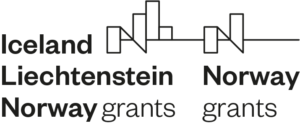
Project ID: project No. 11.1-12/24/433-1
Project Period: October 1, 2024 – April 30, 2025
Budget: €146,478
Lead Partner: Tartu Environmental Education Centre (Estonia, Foundation)
Project Coordinator: Gedy Matisen (gedy.matisen@tartuloodusmaja.ee, +372 56 466 887)
Collaborating Partner: Stiftelsen FEE Norway (Norway, NGO, https://fee.no/)
Project Manager: Lene Jeanette Øverby Haakonsen (ljh@fee.no, +47 907 533 55)
Project Summary:
The project aims to strengthen the partnership, collaboration, and capacity of educational institutions participating in the Green School program in Estonia and Norway, along with their national coordinators, to address climate change through educational campaigns, cooperation, and the sharing of sustainable practices. The project also seeks to foster a sense of meaning and belonging among students and educators.
Objectives of the project:
- Enhance climate literacy among teachers and students in Estonia and Norway by integrating sustainability and climate change education into school management, curricula, and extracurricular activities.
- Promote sustainable practices in educational institutions through the Eco-Schools network, focusing on climate mitigation, digital waste reduction, and biodiversity conservation.
- Strengthen cross-border collaboration between Estonian and Norwegian Eco-Schools programs, promoting the exchange of sustainable practices, ideas, and educational materials.
- Increase community engagement by involving children, youth, and local communities in environmental education initiatives, particularly through campaigns focused on digital cleanup and pollinator enhancement.
Wished outcomes:
- Improved climate education with teachers and students in participating schools demonstrating increased knowledge and awareness of climate change, sustainability, and biodiversity.
- Adoption of sustainable practices in schools and kindergartens in both countries, integrating activities like digital cleanup and pollinator-friendly practices into daily routines.
- Successful implementation of the Digital Cleanup Campaign in Norway for the first time, with further refinement in Estonia, raising awareness about digital waste and promoting responsible digital habits.
- Enhanced teacher training on integrating sustainability into curricula and teaching practices in both Estonia and Norway.
- Stronger cross-border networks through the establishment of long-term partnerships and collaborative efforts between Estonian and Norwegian educational institutions, fostering ongoing collaboration on environmental education.
Concrete outputs:
- Project management structure with a well-coordinated team in both Estonia and Norway, including clear roles, timelines, and communication channels.
- Kick-off meeting and workshop in Oslo, including a training session on the Digital Cleanup Campaign, attended by key stakeholders from both countries.
- Educational materials developed and distributed, including videos, guides, and promotional content for the Digital Cleanup and Pollinator Enhancement campaigns.
- Digital Cleanup Campaign implemented in Norway and Estonia, involving student and teacher participation in reducing digital waste.
- Pollinator Enhancement Campaign created for Estonian schools, including study kits, teacher resources, and starting packages for participating institutions.
- Study trip to Trondheim for Estonian educators to observe best practices in integrating sustainability into school life.
- Communication and dissemination activities organised, including national conferences, community days for families (in Estonia “Every seed counts” and “Notice pollinators”), international presentations to share project results and best practices.
- Indirect support provided through the allocation of resources for essential overhead costs to ensure smooth project execution and sustainability.
Created and adapted materials:
Digital Cleanup Campaign for Estonia:
Digital Cleanup Campaign for Norway:
Pollinator campaign for Estonia:
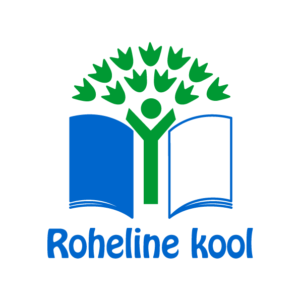
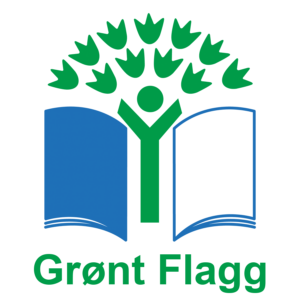
Project name: Bodø-Tartu Duo Networking
Duration: until 31.12.2024
Budget: 9434.56€
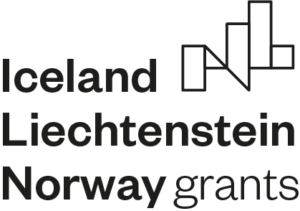
Description: Bodø-Tartu Duo Networking Project is a project that aims at supporting cooperation between cultural institutions from Bodø and Tartu by creating a networking space (meetings, mobility, artists exchange, etc.) and single artists exchange between Bodø/Norway and Tartu/Estonia. The project is financed from the Norway Grant that is distributed by the Embassy of Norway in Tallinn (who also make final decisions on what specifically is covered by the support).
Tartu Nature House (TEEC) and Tartu Art School (TAS) are cooperating with Re Innovasjon and together they have formed a plan for artist recidency, collaboration seminars, meetings and plans to sustain collaboration after 2024.
The inclusion of institutions have been approved by the Embassy of Norway and is justified by Tartu 2024 and Bodø 2024, who have a close connection and certain authority over the partners in these activities.
The activities planned:
23.-26.20.2023 – Meeting in Bodø, planning a joint project
26.01.2024 – A joint project proposal was sent to Creative Europe
6.-8.05.2024 – Meeting in Tartu, networking among art schools network from Europe (by TAS) and exchange of experiences with microscopic ecocritical art workshop (by TEEC).
15.-25.08.2024 – Tartu artist in recidency in Bodø.
13.-22.09.2024 – Re-use Week event in Bodø where TEEC and TAS are providing workshops for public.
Around 20.12.2024 – Final meeting in Tartu Nature House. Conclusions, next steps.
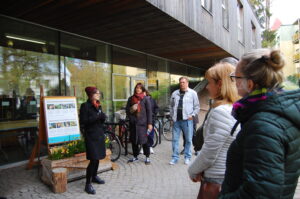
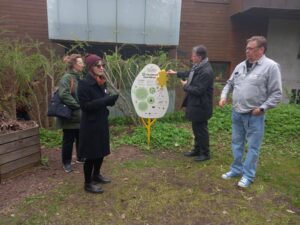
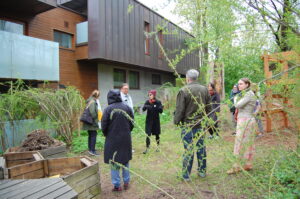
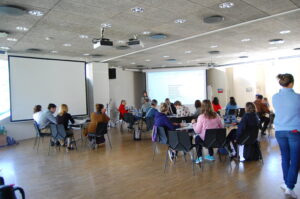
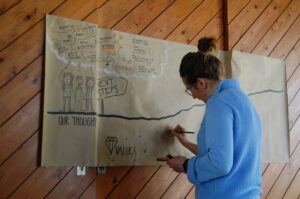
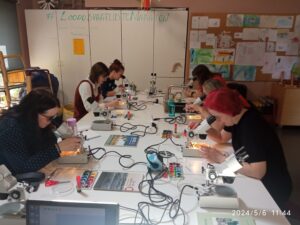
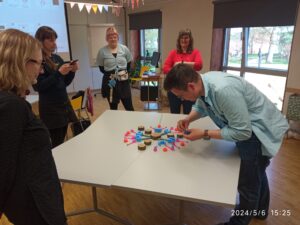
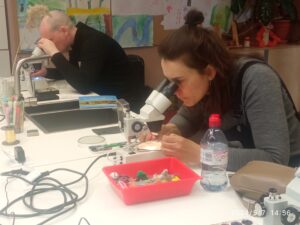
Funding source: Nordplus Horizontal 2024
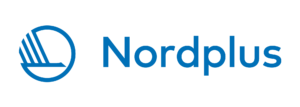
Project ID: NPHZ-2024/10120
Project period: May 2024 – Apr 2025
Total allocation: 70 584 EUR
Leading partner:
- Tartu Environmental Education Centre (EE, Foundation).
Project coordinator: Gedy Matisen (gedy.matisen@tartuloodusmaja.ee)
Co-operating partners:
- For a clean Lithuania, NGO (LT, NGO)
Project manager: Giedrius Bučas (info@savebaltic.eu)
- Norrtälje Nature Conservation Foundation (SE, NGO)
Project manager: Lotta Andersson (lotta@norrtaljenaturcentrum.se)
Project summary:
This is a comprehensive project aimed at advancing environmental and outdoor education for all, fostering sustainability, and promoting cross-cultural collaboration. Through the organization of three educational events in Norrtälje (19.06.2024), Tallinn (16.10.2024), and Klaipeda (13.12.2024) to support the “Save the Baltic Sea” initiative, the project provides hands-on workshops, citizen science opportunities, coastal clean-ups, panel discussions, and lectures addressing the state of the Baltic Sea.

These events serve as platforms for cross-sectoral educators and learners, enhancing basic skills in science, social responsibility, and cultural insight. The emphasis on the Baltic Sea’s condition fosters awareness and deepens participants’ understanding of environmental issues which are needed for green growth and sustainable development.
Additionally, the development of new teaching/learning materials, including an educational program on Baltic regions’ erratic boulders and 6 outdoor ecology research “mobile classrooms”, contributes to skill enhancement and environmental awareness. These materials, intended for translation and online sharing, enable mutual learning and capacity building for organizations involved in outdoor education.
The project’s coordination, management, and networking, facilitated through 12 online and two physical meetings, further enhance professional development. The activities not only disseminate information but also promote cultural exchange and mutual learning among participants from diverse regions, professions and backgrounds to foster social sustainability.
Furthermore, a global online dissemination webinar widens the project’s impact. This initiative reaches a broad audience, fostering environmental awareness, sharing best practices, and showcasing successful initiatives. The integrated approach ensures that the project’s goals, including social sustainability and responsibility toward the Baltic Sea, resonate globally. By eliminating redundancy and maximizing engagement, the project emerges as a dynamic force in environmental education, leaving a lasting impact on participants, organizations, and the wider public.
Recorded webinars:
Webinar “Outdoor Education for sustainability” 18.03.25
Created materials:
Two geology study programs and animations of glacial erratics:
- “In the Footsteps of Glacial Erratics and Fossils” (grades 4–6) combines fossil analysis, marine life videos, and global sand comparisons to deepen ecological understanding and observational skills. Printable worksheets: Sand, Fossil.
- “The Cryptographic Key to Glacial Erratics” (grades 7–9) blends outdoor exploration with indoor logic games, connecting geology with math, chemistry, and teamwork. Printable worksheets: construction geologists, drillers, glacial erratic, palaeontologists, treasure chest, workstation tags, Aseri geological survey, Kaarma geological survey, Jaani geological survey.
- Animated characters of glacial erratics.
Six Mobile Classroom boxes for ecology studies outdoors:
- One box named “Baltic Sea”: Focused on marine ecosystems, sustainability, and student-led inquiry. Box 1 content picture & the teachers’ manual for the Baltic Sea (“Östersjön” in Swedish)
- Two boxes named “Insects, Birds and Plants on Land”: Exploring meadow biodiversity and cultural heritage through art, biology, and games. Box 2 content picture & the teachers’ manual for the Insects, birds & plants (“Insekter, fåglar och växter” in Swedish)
- Two boxes named “Forest”: Encouraging sensory engagement and ecological literacy through games like “The Moose” and fungi-tree relationship studies. Box 3 content picture & the teachers’ manual for the Forest (“Skog” in Swedish)
- One box named “Lake & Stream”: Featuring aquatic biodiversity, water quality testing, and nature-inspired poetry and play. Box 4 content picture & the teachers’ manual for the Lake & Stream (“Sjö och å” in Swedish)
Project name: Together Towards Improved Quality of Environmental Education (QualitE), Project No 2023-2-EE01-KA210-SCH-000185260.
Project supported by: Co-Funded by the European Union, through the ERASMUS+ General Education Small Projects Programme, with a contribution of € 60 000.


Project duration: 01.01.2024 – 31.12.2024.
Project leader: Gedy Matisen, gedy.matisen@tartuloodusmaja.ee.
Project partners: lead partner Tartu Nature House, cooperation partner Helsinki Recycling Centre (Pääkaupunkiseudun Kierrätyskeskus Oy).
Project objectives:
- To create an overview of Estonian and Finnish environmental education quality assessment strategies and tools, to learn from each other’s experiences and to introduce jointly tested versions in institutions in order to raise the quality of environmental education provided.
- Develop an interdisciplinary circular economy curriculum to support the national curriculum, to be offered by environmental education centres to schools to promote circular economy principles and sustainable practices in Europe and beyond.
- Organise training trips and a web seminar to strengthen cooperation between Estonian and Finnish partners, focusing on education for sustainable development and the circular economy.
Expected results:
- May 2024: The first common format of advanced quality assessment tools for environmental education programmes for Estonian and Finnish partners has been established. We will be guided by and cooperate with the environmental education quality systems developed by the Estonian Environmental Education Association and the Finnish Network of Nature and Environmental Schools (LYKE). We will organise an online preparatory course for 16 participants (8 from both organisations) in March and a training trip to Helsinki on 22-24 April, after which we have revised the existing tools and have made recommendations for improvement.
- October 2024: We will organise a web-based preparatory course for 16 participants (8 from each organisation) and a training trip to Tartu on 23-25 September to test the advanced quality assessment tools in the piloting of the new circular economy programme. The circular economy programme incorporates student-engaging methods, emphasises sustainability, resource efficiency, the importance of waste reduction and introduces recycling solutions.
- December 2024: A global webinar will be organised to share project results, experiences and lessons learned with a wider audience. The project materials will be translated into English, Estonian and Finnish and a comprehensive project summary will be produced for wider dissemination.
Our objectives coincide with ERASMUS+ priorities, providing educators with essential tools: tools to assess the quality of their work, a circular economy curriculum and a supportive network for collaboration. These tools will support the professional development of educators to teach future generations how to preserve the environment and tackle climate change.
Materials and results:
- Circular economy program for 7.-9.graders: description in estonian, in english, in finnish
- Circular economy program for 10.-12.graders: description in estonian, in english, in finnish
- Competency model for instructors of environmental education programmes: in english
- Webinar: “Understanding circular economy through quality assurance in environmental education” – in YouTube
- Webinar slides “Environmental Education Quality Assurance Situation Overview from Estonia and Finland” in english
Project website:
The activities and their results will be reflected on the website of Tartu Nature House and on the website of the Finnish partner, as well as on the ERASMUS+ funded projects system.
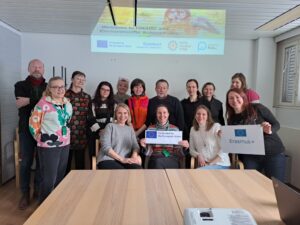
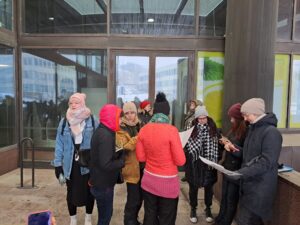
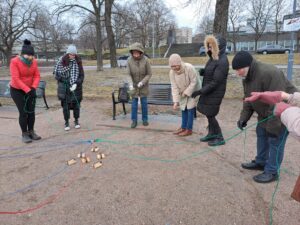
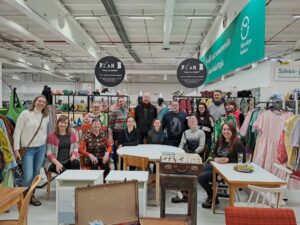 Photos from the joint visit of Tartu Nature House and the Estonian Environmental Education Association to the Finnish partners on 22.-24. April 2024.
Photos from the joint visit of Tartu Nature House and the Estonian Environmental Education Association to the Finnish partners on 22.-24. April 2024.
Project: Empowering youth and teacher network of the Eco-Schools programme for the Sustainable Baltic Sea region.
Duration: 01.10.2020 – 31.12.2021
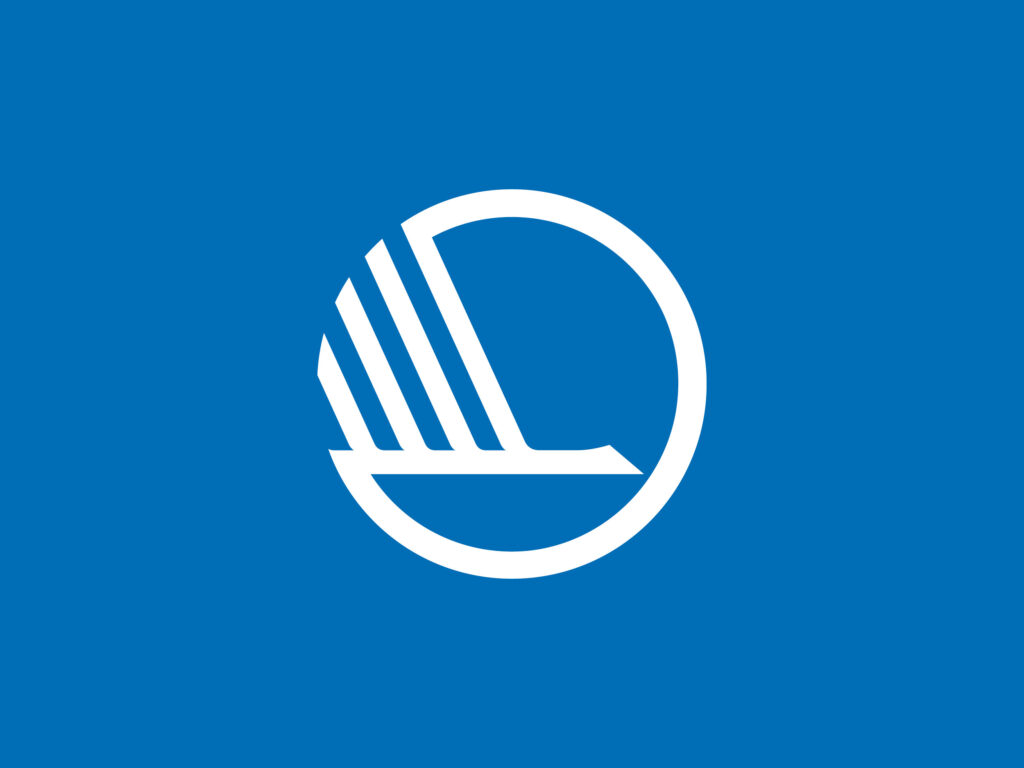 Project is funded by: Nordic Council of Ministers
Project is funded by: Nordic Council of Ministers
Project budget: 78 229.79 eur
Nature House budget: 15 243.82 eur
Project coordinators: Getrin Laanesoo
Partners: Lead partner Foundation for Environmental Education Latvia (FEE Latvia), copartner Tartu Nature House
Introduction:
Our goal is to promote the exchange of experience and cooperation among Nordic&Baltic NGO`s (non-governmental organization) working with Education
for Sustainable Development (ESD) by highlighting environmental topics and develop methods for empowerment of youth. To have a more youthful way to call this new cooperation project our team came up with a more vibrant name of “Baltic Youth Eco Hub”. This name is also used on social media to ensure that our activities are easy to find and follow along with.
Project objectives:
Eco-Schools provides a great basis for young people to form peer groups with similar interests and values and being ready to advocate for their ideas and beliefs. It is important to provide space and time for young people to get inspiration, develop and carry out their ideas. Also, is important to strengthen the competences of educators and support volunteers to be able address and engage young people in the best way possible, and keep their motivation and involvement high. Therefore the methodological material will be entirely developed in a participatory way, combining non-formal and experiential learning methods and approaches for implementation of youth initiatives and mentoring this process along the way while fostering such competences of young people like
citizenship, leadership, entrepreneurship and mentorship. Final product – new Baltic Sea region cooperation of organisations and educators, young people, new experiences and resources, and organised local and international missions and its impact on local communities. We expect new future cooperation among Eco-School program representatives, methodological material could be translated and spread across region and globally.
Project activities:
- Capacity building and experience exchange between partners – activities for partner organisations to develop
new network of Baltic Sea region, exchange an experience and best practice on implementation of Eco-Schools
program and working with different audiences benefiting from the program, as well as developing new
methodological material for youth empowerment and sustainability.
- Youth participation and empowerment activities – addressing and engaging young people to be active citizens
by exploring different environmental topics and implementing activities as well as providing support to their
actions with the help of a mentors
- Competence development of teachers and volunteers – to develop necessary competences for empowerment of
young people to be active citizens and in providing appropriate help and support.
Expected results are networking, gaining new experiences, competences and best practices, methodological
material as a new tool for Eco-Schools, both for young people and educators, broader visibility and recognition of
environmental education and sustainability.
Methodological material for schools:

Additional information about Eco-schools global

Additional Information:
Getrin Laanesoo
projecti coordinator
E-mail: getrin.laanesoo@tartuloodusmaja.ee
Tartu Nature House, Lille 10, Tartu 51010
Allthings.bioPRO – EU project develops serious game to interact with citizens on the topic of bioeconomy
Project Objectives:
- Establish methods to foster awareness, participation and co-creation to ensure citizens’ feedback and inputs’ transfer towards the bio-based industry
- Apply a smart combination of gamification, serious gaming, a mobile app and communication campaign to gather information and data derived by citizens on their ideas and priorities related to specific bioeconomy topics and of direct use for the bio-based industry and the Knowledge Centre for Bioeconomy
- Exploit and further develop the Allthings.bio Platform for bio-based economy communication to the broader public by linking it with the serious game, the smart phone app and a European Bioeconomy Citizen Action Network
- Ensure engagement and uptake of results developed through an early and regular involvement of regional partners and citizens as well as of key bio-based economy stakeholders, policy makers and the Knowledge Centre for Bioeconomy

Duration: September 2020 – August 2023
Project Partners:
- Agency for Renewable Resources (FNR e.V.) | DE (coordination)
- BTG Biomass Technology Group BV | NL
- Wissenschaftsladen Bonn e.V. | DE
- Foundazione iCons | IT
- nurogames GmbH | DE
- Prospex Institute | BE
- Institute of Baltic Studies | EE
- Fashion for Good BV | NL
- Stichting De Natuur – en Milieufederaties | NL
- Tartu Environmental Education Centre | EE
- Vetenskap & Allmänhet | SE
- Laboratorio Interculturale di Ricerca e di Promozione della Condizione (H)umana | IT
More about the project:
Europe’s economy depends on oil and gas for energy and chemistry for all kinds of daily life products but the use of fossil-resources harms the environment and our climate. The bioeconomy offers a way out by providing industrial and consumer products made of biomass and waste. It will make Europe’s economy more sustainable, boost growth and create new jobs. We are at the eve of the transition from the fossil-based to a sustainable and circular bioeconomy.
This is a crucial moment for involving society in this societal and economic transition. Since all individuals, whether as citizens or consumers, will be affected, they should be able to play a role when shaping it. Citizens need to have a say in political decisions and agenda-setting processes in the bioeconomy. On the other hand, it goes without saying that the bio-based industry needs the input of citizens and consumers, to make sure that the products developed are in tune with consumers’ requirements and expectations.
Previous and ongoing projects and initiatives on national and European level have maintained focus on the raising of awareness of the broad public about bio-based products and the bioeconomy. However less has been done to steer the debate and to foster in-depth public dialogue. When introducing new production and consumption models, a debate needs to take shape, with an open space to raise concerns and fears related to it. Citizens have many questions about bio-based products. They are unfamiliar with the terminology which is often quite scientific, they have concerns about quality and functionality compared with traditional products and they demand answers about the sustainability of bio-based products.2 Information about all of this is available and efforts need to be continued and strengthened to have a sustainable and long-term impact on the general understanding and awareness among the general public. This is a precondition to enable citizens to become active contributors to the future development of the bioeconomy in Europe.
More information on the background of the project and about bio-based economy: www.allthings.bio

Eco-Schools is the largest global sustainable schools programme – it starts in the classroom and expands to the community by engaging the next generation in action-based learning.
/foto: www.facebook.com/estoniarussia/
More about the project
GreenMind: Raising Environmental Awareness in Estonian-Russian Border Area
Duration: August 2019 – January 2022
Partners:
Lake Peipsi Project – lead partner (RUS)
Псковский областной центр развития одаренных детей и юношества (RUS)
Peipsi Center for Transboundary Cooperation (EST)
Tartu Environmentl Education Center (EST)
The project aims to contribute to increasing of public green minding for creation of environmentally-oriented, energy-efficient and attractive living conditions and recreation in the transboundary Peipsi/ Chudskoye region. The project capitalizes environmental knowledge and environmental awareness practices in the Programme area develops practical methodological tool-kits for the long-run, educates a substantial number of existing and future environmental education practitioners to work with the project products, and facilitates the establishment of a wider societal context that will secure the sustainability of the project results.
Activities:
The GreenMind addresses issues of environment protection and sustainable use of natural resources in the transboundary Peipsi/Chudskoye Lake area, through the introduction of intensive environmental awareness and educational measures covering such topics as eutrophication, waste management, and energy efficiency.
Project activities are:
- Public events and environmental campaigns will be held.
- Educators, children will be trained for multiplying knowledge.
- Students and families will be involved in green minding process within 2 project contests of social eco-advertisements and “Eco-family”.
- Outdoor public events’ organizers will be trained to organize eco-friendly activities.
- Program area residents will take a personal and active part in the campaigns.
- Residents will be informed about the environmental issues raised by the project.
- Organizations (cafés, supermarkets, petrol stations) will join eco-campaigns and start introducing eco-friendly initiatives.
Project Newsletters:
In media:
Past events:
- Partner meeting in Tartu 30.08.2019
- Pihkva region educational officials and teachers field trip to Estonia November 2019
- … /list will be updated/
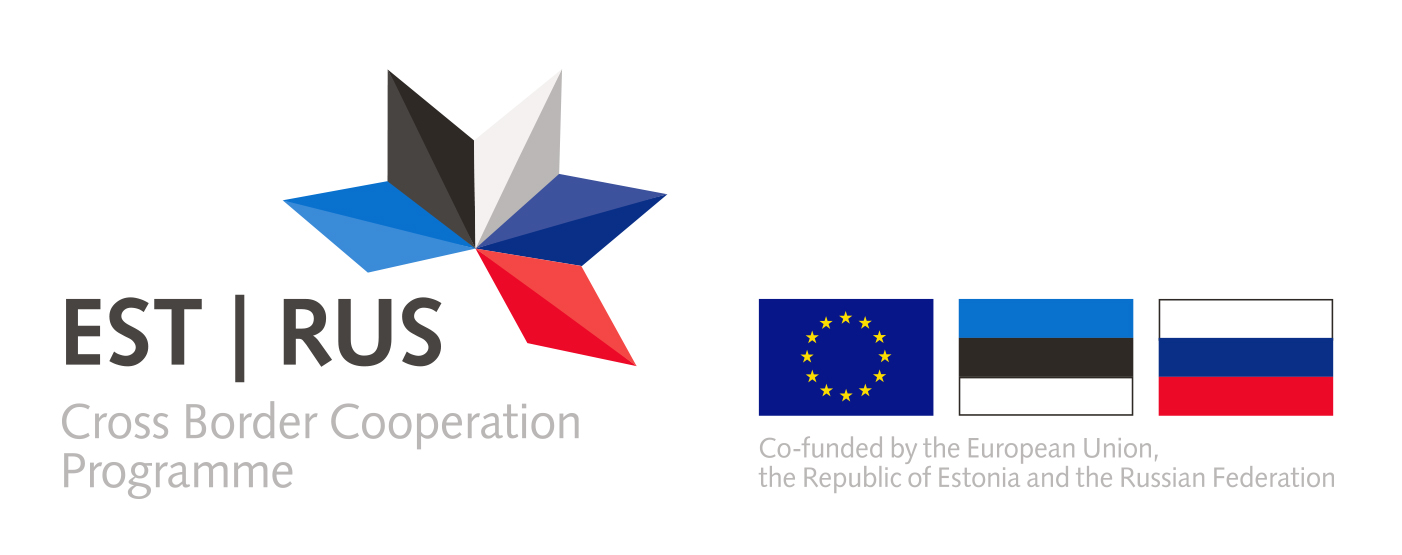
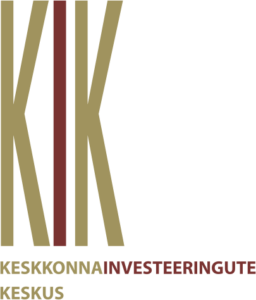
Additional Information:
Eelika Laane-Hannus
project coordinator
E-mail: eelikalaane@gmail.com
Tartu Nature House, Lille 10, Tartu 51010
Project “Energy Saving Advice Across Borders” (Energy Advice) is based on a goal to create cross-border awareness raising campaigns on Energy saving benefits to promote in-depth understanding of energy saving and energy efficiency issues. The project objective will be achieved by organising technically creative workshops for Latvian and Estonian primary school pupils (6th-9th grade) and a cross-border educational competition on energy saving. All information materials, workshops and exhibits developed within the project are very valuable outputs and will be used after the project ends. The activities can be replicated on next year primary school pupils. Wider and deeper understanding of resource efficiency is also the key target result of the project.


The specific objectives of the project are to:
1) Activate and motivate pupils (6th-9th grade) of Estonia-Latvia region, receiving at least 50 applications (from both countries in total) for the Energy Advice educational competition.
2) Increase awareness of people in terms of resource efficiency
The main planned activities:
1) Project management;
2) Joint cross-border marketing campaign for spreading project messages, attracting participants to the Energy Advice competition and raising overall awareness about the cooperation project;
3) Organisation of educational competition Energy Advice for pupils (grade 6th-9th grade) and selection of participants, organisation of technically creative workshops on energy saving to educate and promote intended educational campaign, development of 2 mobile, interactive exhibits and a mascot/character for the cross-border informative and educational campaign.
The main results:
1) At least 50 applications from Estonia – Latvia pupils’ teams (2-3 participants);
2) Technically creative workshops on energy saving at least to 3500 pupils (6th-9th grade) in Estonia-Latvia area;
3) Development of 2 interactive and mobile exhibits to help increase pupils’ awareness of energy saving;
4) 2 Energy Advice mascots for local and cross-border informative and educational campaign activities;
5) 3 motivational awards for the competition finalists’ schools.
Total budget of the project:
259,720.80 EUR
Implementation period:
24 months
Project partners:
Latvia: Ventspils High Technology Park
Estonia: Tartu Environmental Education Centre
Raising awareness on saving resources and reducing waste at public events in Latvia and Estonia
Total budget: 457 942.94 EUR
ERDF contribution: 389 251.49 EUR
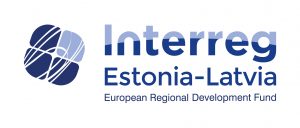
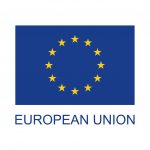
The objective of this project was to raise awareness focusing on waste reduction and energy saving issues among active adults and youngsters, who attend public events by organization of interactive activities at those events, involving the organizers and service providers, and showing that there is also another way how to organize public events.
To facilitate the change in behavior of participants of public events the awareness raising campaign was organized contributing to the greener and environmentally friendlier events at:
Viljandi Folk Music Festival in July 2017 and 2018
Young Scientists’ Festival in Tartu in April 2018
Business Conference in Valmiera in June 2018
Positivus Music Festival in Salacgriva in July 2018
The digital tool and interactive exhibition (creative installations) “Save our paradise” were presented in the Business conference and both music festivals in 2018. During the Young Scientists’ Festival and Viljandi Folk Music festival the energy and waste areas were opened for visitors and they had the opportunity to take part in educative workshops. In total more than 7700 persons took part in the activities offered in the framework of the project “Green Public Events”.
The green guidelines were developed and disseminated among the organizers of the public events in both countries. Guidelines in Estonian, Latvian and English for download are available down in this page.
To support the actions at the events the overall media campaign in Latvia and Estonia was organized, including the outdoors posters – tips for the picnic season in Estonia in summer 2017, posters about avoiding single use dishes in Latvia summer 2017 and in Estonia summer 2018, different posts in social media and video competition for youth (age limit:30).
In total more than 1 000 000 persons were reached by different communication channels of the Estonian-Latvia cooperation project.
Project materials:
Green Guidelines – a practical guide to organizing events



















 Photos from the joint visit of Tartu Nature House and the Estonian Environmental Education Association to the Finnish partners on 22.-24. April 2024.
Photos from the joint visit of Tartu Nature House and the Estonian Environmental Education Association to the Finnish partners on 22.-24. April 2024. Project is funded by: Nordic Council of Ministers
Project is funded by: Nordic Council of Ministers








